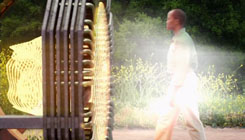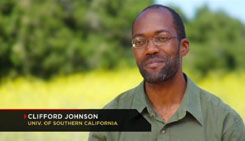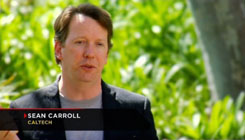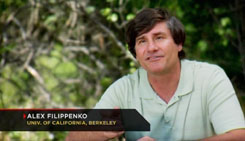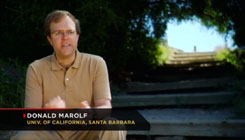This turns out to be one of the best episodes of the fifth season.
Our physicists' ideas for getting a toe-hold into the abstract
theory of time travel are pretty limited - sticking mainly to the
forward-only concept of time-dilation that they expect from
Einstein's theory of relativity and speeds approaching that of light.
I'm still unsure they've thought through the frame-of-reference caveats
such that what an observer sees is what is actually happening.
But, you have to give Clifford Johnson a star for sticking with
the topic long enough to give it much more depth than usual, and for
cleverly adding some wormhole theory in tandem to come up with a good
theory for traveling into the past. This produces what may be the most
memorable imagery in the episode.
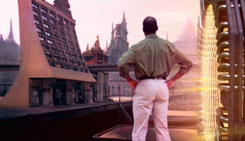
As expected, the good old grandfather paradox is explained
and re-enacted in a refreshingly non-violent permutation, while
beautifully insisting that the universe must have an elegant way
of resolving it. Three elegant solutions are presented, but I'm not sure
why Alex Filippenko thinks the best of those - Level 3 alternate universes -
is so strange and mind-bending. To me, it's everyday background now.
Maybe he'd find it easier if he conceptualized them as branching universes,
instead of calling them parallel.
Also quite interesting is the extensive coverage on the Large Hadron Collider
in Switzerland, and the big questions of physics that it might help solve.
Alpha Centauri Exoplanets?
What knocks this episode up a huge notch is the last 25%,
where we consider the Alpha Centauri triple star system
and everything we knew about it up to 2010 including the possibility
of detecting planets anywhere in it. Of course, it wouldn't do
to explore that without Alpha Centauri expert Greg Laughlin,
who shows up on cue and takes us to the Rose Bowl.
Best of all, the new spaceship for the Universe's later seasons
takes us on a trip to Alpha Centauri, which for once is done
in a more careful and awe-inspiring style than usual, shifting
about halfway to a style closer to
Carl Sagan's "Cosmos" series. This includes
some notably different music - cool!
Ultimately, it seems to me like writer/director Darryl Rehr rocks,
as he always seems to produce episodes of "The Universe" that stand
above and beyond those of his fellow colleagues on the show.
Alex Filippenko:
"Though we think we know a lot about the universe right now,
and we do, there have been many times in the history of physics
when we've been burned by having too much of
a self-assured sense of knowing it all."
Sean Carroll:
"There really are laws of physics that we can't violate,
but there's also technology.
You say, `Well, this is just too hard.
We'll never be able to do it.'
And there, when scientists say things like that,
they're almost always wrong.
It's much safer for us to say,
`Here are what the laws of physics allow us
to imagine doing. Hopefully, someday in the future
we'll build the technology that makes it happen."
|
Participants include:
|
And the "Ask the Universe" question for this episode is...
"Can planets exist in a binary star system?"
- Nicole, Oklahoma City, Oklahoma.
from the disc sleeve:
Time Travel:
The laws of physics do not tell us it's impossible, but the bizarre consequences
of going into the past and altering the future make for mind-bending science.
Explore the possibility of time travel, both to the past and the future,
as HISTORY (TM) hunts for an Earth-like planet 4.3 light years away.
Chapter List:
- Arrow of Time
- Wormholes
- Large Hadron Collider
- Warp Drive
- Alpha Centauri
|
|

